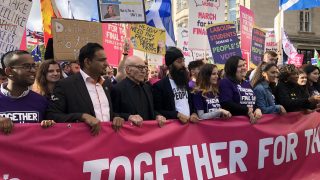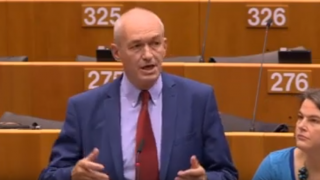
My final speech in the European Parliament
Speaking for the final time in the European Parliament, I explain why I will be voting against the Withdrawal Agreement.

Speaking for the final time in the European Parliament, I explain why I will be voting against the Withdrawal Agreement.

My Final Report – 31 January 2020

Labour List has published my article on why the Party’s ambivalence toward Brexit prior to and during the General Election, ended up being the worst of both worlds.

One of the key arguments repeated time and again by Brexit supporters is the idea that Britain will ‘take back control of our waters’. The notion that the UK could run a completely different national policy, increase its catch by reserving all rights to fish in the UK’s Exclusive Economic Zone (EEZ) to UK fishers, is a far cry from the reality of migratory fish and depleting fish stocks.

Speaking in the European Parliament in Strasbourg, for what will be the final session for British MEPs, on the continued importance of fighting for UK and EU citizens’ rights.

Proceeding with Brexit involves difficult choices. The Johnson deal does not “Get Brexit done”. In fact, it’s simply the end of the first, easier, and less important part – the exit arrangements. Now come the negotiations on the future relationship. It means years more wrangling, arguments and division.

Speaking in Strasbourg after the UK General Election, I reminding MEPs that 53% of the UK voted for parties that voted for a second referendum, and that PM Johnson is already reneging on promises he made and will press for a Hard Brexit.

Reflecting on the poor election result for our party in Labour List, I argue that our Brexit policy was not wrong, but that it did not go far enough.

I recently caught up with Alex Sobel, Labour candidate for Leeds North West, and Mike Galsworthy, activist and campaigner for Scientists in the EU and recorded a video of our discussion.
Theresa May continues to kick the can down the road with regard to what to do about Brexit following the historic government defeat on 29 January.
January saw Theresa May’s Brexit deal defeated by a humiliating 230 votes which (despite her delaying tactics to try to garner support) made it the biggest government defeat in British history.


Addressing the Labour and Left bloc near Hyde Park at the start of the Let Us Be Heard march. Click here to start video.

For the past three years, the fate of this country has been held hostage by internal ideological squabbling of the Tory Party. It’s time to let the people be heard and give them a final say on Brexit.

My contribution to the Brexit debate in the European Parliament, outlining how Boris Johnson is playing the blame game, tabling proposals that are unworkable and which he knows the EU and people on the island of Ireland will reject.

My contribution to the Brexit debate on Monday 23 September at Labour Party Conference in Brighton.

Writing in Labour List I explain why Labour cannot afford to be ambiguous about the next EU referendum.

Speaking in the European Parliament debate on Brexit about Johnson’s minority government, opposition parties united against no deal, and the shift against Brexit among the British people.

There are, yet again, several possible Brexit scenarios in the weeks ahead: Johnson sits on his hands, allows the clock to tick down until the 31 October deadline, and Britain leaves the EU without a deal, despite what Johnson previously promised and despite the fact that Parliament has voted against such a chaotic and costly […]

I have co-written an article in Labour List with my colleague Jude Kirton-Darling MEP and Mike Buckley of the Labour for a People’s Vote campaign.

It was a pleasure to join the “No to Boris. Yes to Europe” rally in London today. Here is a video and some photos from the event.

Knowing that they are losing the support of public opinion back home, the new Brexit Party MEPs have decided to focus their efforts on denigrating, ridiculing and demonising the institution they chose to stand for.

The shift of emphasis of Labour’s Brexit stance to demanding a public vote on any Brexit outcome may be taking a long time, but it is happening. Moreover, it is fully justified.

This week I was interviewed by France24 on the European elections and Labour’s Brexit position.

Interviewed by Joanna Gosling on the European election results and what this might mean for shifts in Labour Party policy.


Looking behind the Farage-focussed headlines to see what the UK voters were trying to tell Labour, and the country.

Interview with Adam Boulton on All Out Politics on Labour’s European Election manifesto.

My interview with Nick Robinson prior to Labour’s launch of the manifesto for the European elections.
![Courtesy ChiralJon [CC BY 2.0 (https://creativecommons.org/licenses/by/2.0)]](https://richardcorbett.org.uk/wp-content/uploads/2019/04/2048px-Brexit_Protestors_London-320x180.jpg)
Brexit is turning out to be very different from what was promised by the Leave campaign three years ago, so it is justified to ask people to confirm whether they wish to proceed or not.

Speaking in the final European Parliament session before the May elections, the day after the terrible blaze at Notre Dame de Paris, I reflect on President Tusk’s comments that ‘we are bound by more than just treaties’.

After an unpredictable few days and weeks, the EU27 and the UK have agreed to a further extension until 31 October 2018. Here I talk about what this means for our continued membership, MEP elections in May, Brexit and the increasing possibility of a confirmatory ballot.

Talking to BBC News about the extension of Article 50, European elections and the importance of having a confirmatory ballot on whatever deal emerges.

Speaking to a lively crowd of Brits and other EU citizens outside the European Council building as the 28 heads of government considered the Article 50 extension request from the UK.

Theresa May gave a speech in Grimsby today ahead of the second “meaningful vote” on her Brexit deal in Parliament on Tuesday. You can read her speech, with my comments inserted, here.

There is currently much talk about how the likely extension of the Article 50 deadline affects the obligation or otherwise of holding European Parliamentary elections in Britain in May. What is the legal situation? Scenario 1: Article 50 deadline is extended up to a date before the new European Parliament first assembles on 2 July […]

To be able to fly across borders, there must be an agreement in place between the countries concerned. Britain has agreements with over 150 countries. Traditionally, these are extremely restrictive, governing down to individual flight slots for specified airlines. Far and away the most permissive and enabling is what we have secured within the European Union.

Some Labour MPs are uneasy about our leadership calling for a referendum on May’s Brexit deal. They have four main arguments against this position. My latest article in Labour List challenges their assertions.


Looking beyond Westminster procedures, government splits, and other shenanigans, there are only four possible outcomes of the Brexit saga.

Despite her focus on it, the “backstop” is not the main problem (if indeed it is a problem) with her deal. There are plenty of other problems with it that she wants us to ignore.

Brexit has illustrated once again that the British press and politicians immersed in the notorious ‘Westminster bubble’ underestimate just how much their European colleagues understand them.

I have co-written an article for Labour List with Wakefield’s MP Mary Creagh. We recognise that some Labour MPs are hesitant about holding another EU referendum, but although we understand their caution, the arguments simply don’t stack up.

The “Norway Plus Group” of MPs have put forward a paper called “Common Market 2.0” as a possible alternative Brexit deal to current deal. I analyse how credible it actually is, in this long read.

I was invited to speak to members on the left of the political spectrum on the the possible way forward to a second referendum on Brexit.

Speaking at the People’s Vote rally, minutes before the meaningful vote is announced on 15 January.

Within 24 hours of losing the ‘meaningful vote’ by an unprecedented margin, Theresa May defeated a vote of No Confidence in her government. So how does Parliament proceed?

Although the new year has seen several Brexit options being discussed, in fact the actual options for Labour MPs on Brexit are increasingly clear. My latest article for Labour List.

Interviewed on Sky News alongside Charles Tannock MEP to discuss the developing situation with Brexit, as Theresa May returns empty handed from Brussels two days after the damaging no-confidence vote from her MPs.

Speaking in EP on the continued Brexit chaos as Theresa May cancels the meaningful vote on the Withdrawal Agreement that she expected to lose.

On the day that the EU Council agreed the Withdrawal Agreement and the text of the Political Declaration, I was interviewed by Adam Boulton on Sky News.

After nearly two years of wrangling, more between the rival factions within her own party than with the EU, over the manner of the UK’s mooted departure, Theresa May agreed last week to an unpopular Withdrawal Agreement. Then, like a disorganised undergraduate who realises the night before that a paper is due, she hurriedly threw […]

Richard Aikens has argued that the EU cannot succeed because it will become a federal state that most of its citizens do not want. He makes a number of assumptions and, in my view, latches on to several misconceptions, which I address in this piece.

Speaking in the European Parliament debate on the Evaluation of the Lisbon Treaty (for which I was Rapporteur) to dispel some of the false narratives that opponents of the EU like to peddle.

Speaking in the Conclusions of the October EC debate as the UK government misses yet another deadline, leaving only a few months remaining to negotiate any Brexit deal.

Writing for Labour List I argue Labour colleagues should not enable right-wing Tory and UKIP politicians – who fear that the people may have changed their minds – in opposing a public vote on the Brexit deal.

Uncertainty reigns supreme in the Brexit negotiations. But what is now clear is that Brexit will weaken our rights, protections and shared standards. And while many hundreds of articles have been written on customs unions and chlorinated chicken, scant attention has been paid to what Brexit specifically means for our youngest generation. How might children be affected by Brexit?

Visiting Fortshot House Farm near Wike last week I discussed a number of issues facing farmers in Yorkshire, with none more pressing than what Brexit could mean for their future.

Speaking in the European Parliament debate in preparation for the next European Council meeting on 18-19 October, I point out that the Brexit being offered to the UK, including Leave voters, is not what they were told and not what many voted for.

Brexit has been one of the main issues discussed at this year’s Labour Party Conference, and Labour’s policy has been clarified. Here is a summary of where we stand now, and how the various options may play out in the coming weeks.

Interviewed by Adam Boulton while at Labour conference.

Some reflections on recognising the importance of democracy in today’s heated political climate.

Speaking on a second panel at the Leeds for Europe event, I outline three strong arguments in favour of the EU.

Speaking on a panel at the Leeds for Europe event in September on why there are increasing calls for a People’s Vote.

The two year Article 50 period runs out in March 2019, but Theresa May’s terrible handling of the Brexit negotiations, and the Conservative party’s bitter divisions mean that it is still very difficult to predict where the UK will be politically in the next few months.

The two Russian nationals charged by the CPS of committing the Salisbury nerve agent attack have returned to Russian, from which there is no extradition. However, the UK has already obtained a European Arrest Warrant which will ensure that the two men are brought to justice in the UK should they ever enter an EU country.

Make no mistake: the government impact papers outlining the dire consequences of a no-deal Brexit are intended to frighten everyone into supporting a deal – any deal, if it manages to secure one. These papers are a decoy.

As the possibility of a no-deal Brexit scenario increases, and the government publishes its “no-deal preparedness” notices, it is worth taking stock of the sheer variety of problems that would arise with a no-deal Brexit.

Earlier this week, a video emerged of French fishers attacking UK vessels harvesting scallops in the Bay of Seine. Could this clash be indicative of disputes that Brexit may bring to the fishing industry?

Radio Interview with LBC’s Matt Stadlen on Brexit, the People’s Vote campaign and Labour’s evolving policy position. (8 minutes long.)

Consumers across Europe have benefited greatly from EU-wide rules which not only protect them when buying products in their home country, but also when making cross-border purchases. So what benefits might British consumers lose if the UK leaves the EU? And, if we go ahead with Brexit, what measures should the government take to lessen these potential impacts?

Talking to Adam Boulton on Sky News about Theresa May’s newest Brexit fudge that emerged from Chequers and prompted the resignations of David Davis and Boris Johnson.

I recently visited the Textile Centre of Excellence in Huddersfield. Speaking with Managing Director Bill Macbeth gave a fascinating insight into the history of textiles in the region. But it also came with some worrying warnings about Brexit.

I was interviewed by Jo Coburn on Friday’s Daily Politics show, discussing the lack of progress with the Brexit negotiations at the crucial June European Council.

Whether or not the Prime Minister is having an existential crisis, the theatrics of the EU Withdrawal Bill going through Parliament cannot distract from the embarrassing fact that, yet again, she was turning up to a European Council summit with nothing to offer.

Evidence has emerged of links between pro-Brexit campaigners and intermediaries for the Russian Government. In addition, a study has revealed that over 156 000 Russian-based Twitter accounts were engaged in a concerted campaign to Leave.

Speaking in the Fisheries committee of the European Parliament on the leaked government white paper for its post-Brexit fisheries policy. They cannot deliver what was promised during the referendum campaign.

It is not just the UK Parliament that will vote on the Withdrawal Agreement. The European Parliament will too.

Labour List have published my piece explaining how many concerns about immigration can be addressed under current EU rules, if the UK government was prepared to use the powers it has available.

In each of the five foundations of the Industrial Strategy – ideas, people, infrastructure, business environment and places – we learn more about the advantages of staying in the EU than the supposed opportunities outside it.

As all eyes are fixed on the footballing world, the lingering questions over what Brexit will mean for our local football teams loom large.

Two years after the referendum, the Conservative government still has not clarified its starting position for the Brexit negotiations.

Short speech during the Future of Europe debate on 30th May 2018

Speaking in a debate on the Better Law Making report I explain how the EU has a higher threshold than many national parliaments for introducing regulations, and how these reduce red tape across all 28 countries. Divergence creates more complexity, as the UK government is quickly discovering.

Short and Sweet!

Interviewed by Emanuel Nunes at my Leeds constituency office.
The introduction is in Portuguese but most of the video is in English with Portuguese subtitles.

Discussing the Labour Party’s positions on various aspects of the ongoing Brexit negotiations – May 2018.

The Falklands and other overseas territories will be affected if we leave the EU. They were overlooked during the debate and Falkland Islanders weren’t even given a vote in the referendum. It’s time we started talking about what’s at stake.